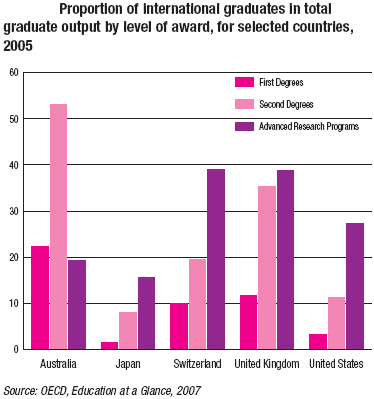|
News & Views item - November 2007 |
![]() And the Dearth of Higher Degree Researchers. (November 10, 2007)
And the Dearth of Higher Degree Researchers. (November 10, 2007)
The Group of Eight, in publishing its third paper on the requirements for upgrading Australia's university sector, has addressed the growing shortage of higher research degrees (Masters and PhDs) awarded by Australian Universities: "Australia is not producing enough highly skilled graduates to sustain economic growth. We are not producing enough new researchers to replace those leaving the workforce, let alone expanding our capacity to meet the challenges of the future."
In July last year Australia's Federal Minister for Education Science and
Training, Julie Bishop, released the official
audit of Australia's scientific, engineering and technology skills![]() .
During its tenure in office the Coalition Government under the Prime
Ministership of John Howard has under-resourced the maintenance and
development of "Science, Engineering and Technology Skills" to the point
that the audit by its Department of Education, Science and Training
warns in its final report that Australia is likely to suffer a
short-fall of as much as 35% in its estimated requirement of 55,000
additional scientific professionals -- that is of meeting its projected
need for an extra 55,000 scientific professionals within six years. That
comes to a shortage of just over 19,000 individuals.
.
During its tenure in office the Coalition Government under the Prime
Ministership of John Howard has under-resourced the maintenance and
development of "Science, Engineering and Technology Skills" to the point
that the audit by its Department of Education, Science and Training
warns in its final report that Australia is likely to suffer a
short-fall of as much as 35% in its estimated requirement of 55,000
additional scientific professionals -- that is of meeting its projected
need for an extra 55,000 scientific professionals within six years. That
comes to a shortage of just over 19,000 individuals.
Now, seventeen months later, ANU's vice-chancellor, Ian Chubb, speaking for the Group of Eight says:
Australia's productivity and competitiveness requires a reversal of these trends. At the current rate Australia will not be able to supply even half the future requirement of PhD graduates for high-end knowledge skills."
In the middle of Australia's mining boom only 65 Australian students
commenced a PhD in geology last year. And at a time when the world is facing unprecedented environmental stresses, a mere 53 new
PhD students are undertaking environmental studies.
the world is facing unprecedented environmental stresses, a mere 53 new
PhD students are undertaking environmental studies.
Overall the number of Australian students starting higher degrees by
research fell by 30% from 1995 to 2006.
As the Australian economy becomes more knowledge-based, an increasing
proportion of research degree graduates (73% in 2006) are working
outside the academic sector, many in innovating enterprises.
Government and industry investment in research and development has grown
in recent years, in part stimulated by the Backing Australia's Ability
initiatives I & II. Yet Australia's proportion of doctoral graduates in
the workforce is slipping behind our competitors.
Over the next decade some 40% of the academic workforce will either
retire or move into other jobs. Training new researchers through their
PhD and post doctoral studies takes seven to ten years which means
urgent action is required to provide teaching and research capacity for
the future.
Among other urgent essential changes specified by Professor Chubb are increases in the availability of scholarships to attract top PhD candidates from overseas.
We are turning away hundreds of good international applicants because we can only go so far in finding funds for them without weakening our research capacity.
International students made up only 19% of PhD enrolments in 2005
compared with 22% of Bachelor degree and 53% of Master degree
enrolments.
In the US, almost half of all international graduate students, and
two-thirds of foreign PhD students, are financed by scholarships or work
in universities. By contrast, less than 25% of international graduate
students in Australia receive support from Australian sources.
The Go8 calls on the incoming Government to boost the number of
HECS-exempt domestic PhD places and allocate them on the basis of
capacity to provide quality research training, expand the number and
value of stipends for research students, extend support for early-career
and mid-career researcher development and initiate measures to attract
quality international PhD students.
Note added November 12:
Education Minister Julie Bishop said Professor Chubb had ignored the
greater flexibility and strong support given by the federal Government
to individual universities, such as Melbourne, which had a focus on
postgraduate education and research.
Tom Spurling, president of the Australian Federation of Scientific and
Technological Societies, the peak lobby group for Australian scientists,
warned that Australia's prosperity could be placed at risk unless the
number of highly skilled science and technology graduates was increased.